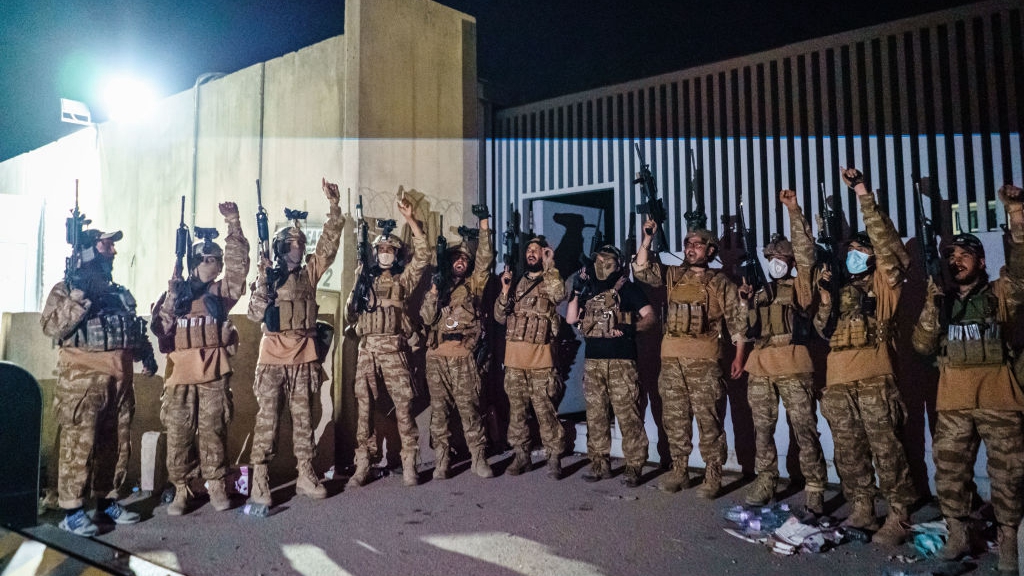
Taliban fighters celebrate before storming into Hamid Karzai International Airport, wielding American supplied weapons, equipment and uniforms after the U.S. military completed their withdrawal in Kabul, Afghanistan, August 31, 2021. /Getty
Taliban fighters celebrate before storming into Hamid Karzai International Airport, wielding American supplied weapons, equipment and uniforms after the U.S. military completed their withdrawal in Kabul, Afghanistan, August 31, 2021. /Getty
Editor's note: Hamzah Rifaat Hussain is a former visiting fellow at the Stimson Center in Washington and serves as assistant researcher at the Islamabad Policy Research Institute in Pakistan. The article reflects the author's opinions and not necessarily the views of CGTN.
The U.S. retreat and where it leaves Afghanistan today demonstrates that political power change, tinkering with internal political dynamics and exporting democracies in countries defined by unique social systems will result in nothing but countless egregious failures.
As all U.S. operatives have been evacuated and a refugee exodus is in full flow, the rule remains the same. Sovereign countries should govern themselves based on sovereign prerogatives and not dictates which is precisely what has materialized in Kabul.
While U.S. President Joe Biden did speak about how the U.S. era of nation-building is over, actual policy proclivities and what can be expected suggests otherwise. Much of this is grounded in historical precedence.
The post 9/11 George Bush era, for example, was characterized by pernicious campaigns of toppling regimes considered despotic yet conversely their fall was followed by chaos and instability engulfing the entire Middle East, the harming of sustainable peace in Iraq in the post-Saddam Hussein era being a case in point.
Similarly, across North Africa, the attempt to instigate chaos against established governance systems has resulted in a breakdown in social order and the proliferation of terrorism. The foreign policy baggage which the U.S. currently holds is replete with such examples and the latest attack at the Hamid Karzai International Airport in Kabul is a manifestation of how alpha elements and militants thrive in peace vacuums.
Washington's exit is divisive and polarizing and buttresses the long-held assertion that meddling in internal affairs does not pay.
The contradictions in what was purported and what was implemented are also glaring and obvious. Note that former President Bush in 2002 invoked "the traditions of George Marshall" as part of Republican foreign policy with a repeat by his Democratic successor Barack Obama. The latter asked American citizens to pay heed to the lessons of Marshall despite both Presidents pursuing plausible deniability with regard to nation-building.
This constitutes a duplicitous approach or an in-between policy that divorces public rhetoric for actual operationalization. The truth is that the seeds of failure were sown way earlier and to disassociate from these facts is unbecoming.

U.S. Army soldiers in Khogyani district, Nangarhar Province, Afghanistan, August 12, 2015. /CFP
U.S. Army soldiers in Khogyani district, Nangarhar Province, Afghanistan, August 12, 2015. /CFP
Voices have been raised internally in the United States as well. Washington Post correspondents have admitted that while covering events unfolding within the country immediately after 2001, they noted that efforts were afoot on part of U.S. Congress to pursue nation-building, albeit not at the scale of the Marshall Plan after World War II.
Note further that in 2010, President Obama complimented the surge in troop deployment with civilian-run "provincial reconstruction teams",which despite their purported noble orientation at rebuilding schools, clinics and distributing aid, actually stripped off capacity-building measures from provincial governments, undermining their ability to cater to their respective constituencies.
Even more controversial was the fact that the PRTs initiated such as those in Helmand province had shut down a few years later after 2010 with some of their projects left incomplete. The result was more chaos, no improvement in literacy rates or governance models and widespread acrimony against the United States.
By historically not accepting diverse governance models in other sovereign states that differ from Washington's, sustainable peace will never be possible in any country, let alone Afghanistan. The 20-year campaign to dethrone the Taliban while conversely pushing back against Al-Qaeda operatives responsible for 9/11 came at the expense of facilitating peace and has only resulted in humanitarian quagmires which were not followed up with improvements in living standards for average Afghans.
This has been a dangerous precedent set in stone by numerous U.S. presidents who have exported intervention and touted it as an American moral obligation. The moral aspect would have been true if actual indices improved or Afghans resorted to staying within their country instead of becoming refugees. None of this should be repeated anywhere.
Such projects do not succeed. If such relentlessness in pursuing nation-building as an instrument of foreign policy continues unabated in other regions beyond South Asia, conflict resolution would always remain elusive. Like many countries at the receiving end of U.S. sanctions and internal meddling, Afghanistan certainly deserved better.
(If you want to contribute and have specific expertise, please contact us at opinions@cgtn.com.)

